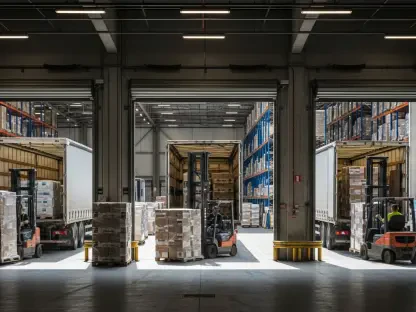The air cargo industry is undergoing a dramatic transformation, driven by evolving market demands, technological advancements, and the explosive growth of e-commerce. Airlines are not merely responding to a temporary disruption anymore; they are actively shaping the future of air cargo with long-term, strategic changes and innovations. This post-COVID landscape is markedly different from its predecessor, pushing airlines to pivot and adapt in unprecedented ways.
The Strategic Pivot: From Passenger to Cargo
Many airlines, traditionally focused on passenger transport, have now strategically moved into the cargo sector. This shift, exemplified by SmartLynx Airlines, isn’t a knee-jerk reaction to the pandemic but a calculated response to enduring market changes. Originally a passenger airline, SmartLynx quickly saw the potential in cargo and transitioned to become a key player in the sector. Their fleet now includes converted Airbus A321 freighters, integral in forming partnerships with logistics giants like DHL.
This diversification was not an overnight decision for SmartLynx. The airline had long foreseen the potential for growth within the air cargo market. By 2024, they are operating 13 A321P2F freighters, with more expansion planned, affirming their commitment to effectively meeting specific market demands. This strategic move exemplifies how airlines can leverage cargo not only as a temporary measure but as a sustainable and profitable business model. The industry’s pivot towards cargo is a clear indication of its ability to adapt and thrive amid changing market dynamics.
Embracing Technological Advancements
At the heart of this transformative shift lies technology. Airlines like SmartLynx have invested heavily in digital tools and advanced systems to enhance operational efficiency and customer service. One notable innovation is the automated loading systems used for A321F freighters, which significantly reduce turnaround times to just 40 minutes. These systems allow airlines to maximize the time their aircraft spend in the air, thereby improving overall efficiency and customer satisfaction.
Advanced software for flight planning, weight, and balance plays an essential role in optimizing every operational aspect. These technological enhancements ensure that cargo operations are not only efficient but also scalable. By providing precise data and streamlined processes, these systems enable better resource management, which is crucial for sustainable growth in a competitive market. These tools embody a broader industry trend of leveraging technology to meet present and future demands.
The E-Commerce Boom
E-commerce has undeniably surged as a crucial driver of air cargo growth, fundamentally reshaping how the industry operates. The global pandemic accelerated the shift towards online shopping, and even though the initial spike has stabilized, the upward trend continues. Data from the International Air Transport Association (IATA) reveals a 13.4% year-on-year increase in cargo demand for the first half of 2024, demonstrating the sustained impact of e-commerce on air freight.
Airlines have strategically positioned themselves to tap into this burgeoning market by tailoring their operations to meet e-commerce needs. With their ability to offer quicker delivery times and handle high volumes of parcels, air cargo carriers provide solutions that other transport modes often cannot match. This positions cargo airlines as indispensable players in the global supply chain, further solidifying e-commerce as a major driver of industry growth.
Navigating Market Challenges
Operating in the air cargo market, particularly in regions like Europe, comes with its set of unique challenges. High competition and a global pilot shortage present significant hurdles. However, airlines like SmartLynx manage to navigate these challenges through strategic client engagement and a relentless focus on operational efficiency. By understanding and addressing the specific needs of their clients, airlines can offer customized solutions that help maintain competitiveness in a crowded marketplace.
Optimizing operations to ensure maximum performance is another crucial strategy employed by these airlines. This not only helps them stay ahead of the competition but also addresses the logistical and resource constraints posed by the industry. These strategies are essential for overcoming market challenges and capitalizing on growth opportunities, making them a critical aspect of modern air cargo operations.
Commitment to Sustainability
Sustainability initiatives have moved from being optional to becoming essential for modern air cargo operations. SmartLynx, for instance, has emphasized environmentally friendly practices by incorporating fuel-efficient aircraft like the A321F into their fleet. These aircraft consume less fuel and produce lower noise levels, aligning with global environmental goals and reducing the overall carbon footprint.
The use of advanced flight planning and optimization software further enhances their green initiatives, ensuring that their operations are as environmentally friendly as possible. The adoption of paperless cockpits nearly a decade ago is a testament to their long-standing commitment to sustainability, a commitment that extends seamlessly into their cargo operations. This proactive stance not only benefits the environment but also positions airlines favorably within a market increasingly driven by eco-conscious choices.
Future-Proofing through Innovation
The air cargo industry is experiencing a significant transformation, driven by evolving market demands, advances in technology, and the explosive growth of e-commerce. This shift is not just a response to a temporary disruption but marks a strategic long-term change as airlines reshape the future of air freight. In the wake of the COVID-19 pandemic, the landscape has changed dramatically, requiring airlines to pivot and adapt like never before.
Technological advancements such as automated warehouses, real-time tracking systems, and the integration of artificial intelligence are setting new standards for efficiency and service. Moreover, the rise in e-commerce has created unprecedented demand for rapid, reliable shipping solutions, compelling airlines to adjust their logistics and scale accordingly.
Sustainability is also a growing focus, with companies exploring greener fuel alternatives and more efficient routing to reduce carbon footprints. As a result, the air cargo sector is not just bouncing back but is on a path to more robust and strategic growth, making it more resilient and responsive to future market shifts. The industry’s adaptability and innovation are paving the way for an exciting future, holding promising opportunities for growth and evolution.









